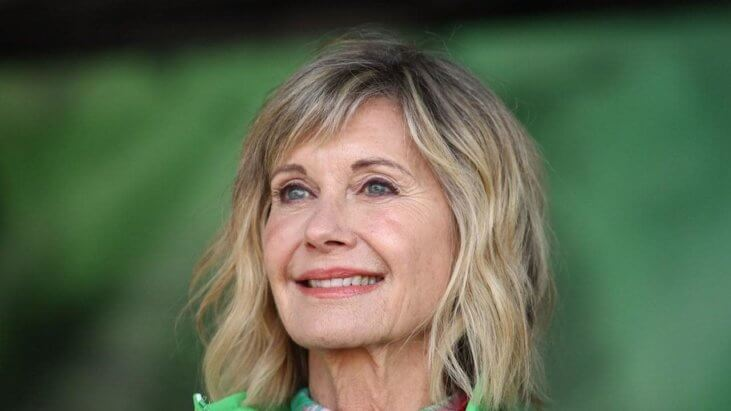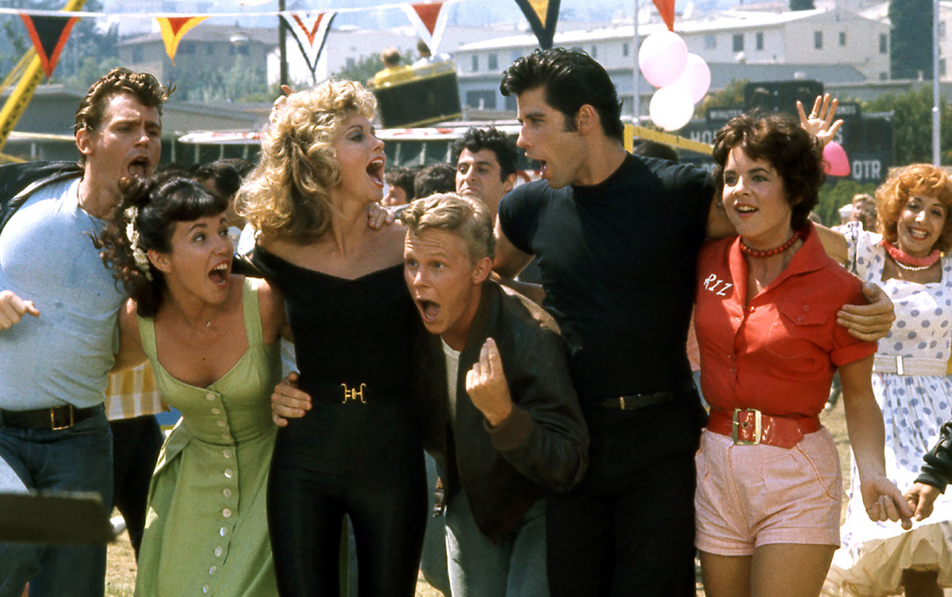
Olivia Newton-John insists “positive thinking” is vital amid her fight against stage-four metastatic breast cancer. That seems to be the case for Olivia Newton-John, who says
she’s doing great and enjoying every minute of life she can while battling cancer for the third time.
The legendary actress-and-singer was first diagnosed with breast cancer in 1992, which eventually went into remission, before her cancer returned in 2013 and she was then told in 2017 that the cancer had metastasized to her bones.
Her husband, John Easterling, has been helping her throughout her health journey by growing medicinal cannabis to help ease her symptoms on a raunch in the US, where it’s legal. And the ‘Grease’ star is campaigning for the “healing plant” to be made legal in her home country to help others suffering from chronic pain.
Olivia told Australia’s Who magazine: “Positive thinking is so important
to living a healthy and happy life.”
The 73-year-old star insisted: “Medicinal cannabis is something that should
be available to everyone who is going through a chronic illness or pain.
The ‘Physical’ singer – who has been using various herbs to relieve her pain – previously admitted she is “very lucky” to be married to a “plant medicine man”. She said: “I’m very lucky to be married to a wonderful man who is a plant medicine man, and he has great knowledge. Now he’s growing medicinal cannabis for me, and it just has been wonderful. It helps me in every area.”
Meanwhile, Olivia revealed she found new determination to end cancer following the death of her close friend Kelly Preston – who was the wife of Olivia’s ‘Grease’ co-star John Travolta – in July 2020.
The star said Kelly’s death “strengthened [her] resolve” to help those researching
a cure to the disease through her Olivia Newton-John Foundation.
She said: “Kelly was a lovely woman and incredibly tragic loss.
It just strengthened my resolve to find an end to cancer.
“Losing friends and losing people that you care about just makes me even more determined to do this research.”

“I don’t like the phrase ‘fighting cancer’ because that sets up images of battles and anger.
I choose to see my body as winning, which is a much healthier mental picture,”
Newton-John described her own positive frame of mind in the interview.
RELATED: Love Conquers All: How Olivia Newton-John’s Second Marriage Gives Her Strength On Her Cancer Journey
Newton-John’s cancer history.
Newton-John was first diagnosed with breast cancer in 1992. At the time, she received nine months of chemotherapy and a breast removal surgery, called a mastectomy.

Olivia Newton-John’s second husband, John Easterling,
is the founder of the “Amazon Herb Company.”
Her cancer then entered remission until 2013, at which time her doctors discovered that her cancer had metastasized (spread) beyond her breasts. She overcame the cancer again, only to see the same happen again in 2017, when her doctors discovered a tumor in her sacrum, the bone at the bottom of the spine—another cancer metastasis.
RELATED: Olivia Newton-John to Auction Off Her Iconic “Grease” Black Leather Jacket, Skin-Tight Pants For Cancer Charity
The tumor in her sacrum left Newton-John with a fractured hip, which took over six months to heal. She has since been treated with a combination of conventional therapy, diet, and using marijuana to alleviate cancer-related pain and depression.
The Pants from Grease.
For a lot of people with cancer, finding ways to give back to the cancer community can be
a really important part of the journey. For Olivia Newton-John, who has been enormously generous throughout her cancer journey in building the Olivia Newton-John Cancer Wellness & Research Centre in Australia, that includes selling the pants she wore in her star making role as Sandy in the hit musical movie Grease.

The gang from “Grease” including future cancer “thriver” Olivia Newton John.
This fall, the iconic trousers and leather biker jacket she wore in the movie will be auctioned and the proceeds donated to her research hospital.
When talking about the pants and jacket, Newton-John said that she tried them on after she first got ill, and was able to shove herself into the pants, even though it was tough, ‘Although I had lost quite a bit of weight at the time because it was just after I’d got ill,’ And that she hopes that the fundraiser will draw in a lot of money, “I hope to raise a million dollars,” she said.
“It won’t be a wrench to part with them because they were never really mine.
They were Sandy’s. And, of course, they’ll help fund my research centre.”
“So, selling them is a joyful thing,” she said about her attitude toward parting with the coveted outfit.
She also said that there was something about aging that made her want to streamline
her life, and get rid of some of the extra items, “And I think as you get older, you want to simplify things. You have so much stuff and that’s not what’s important in life.
Memories are enough.”

BEVERLY HILLS, CA – AUGUST 15: Olivia Newton-John and John Travolta attend
The Academy Presents “Grease” (1978) 40th Anniversary at Samuel Goldwyn Theater
on August 15, 2018, in Beverly Hills, California. (Photo by Jon Kopaloff).
Newton-John said she remembers the time around Grease fondly.
Olivia Newton John | John Travolta duet.
“I’m still in contact with a whole bunch of people from Grease,” she said. Didi Conn, who played Frenchy in the movie, remains a close friend. And Olivia and John Travolta, now 65, have kept in touch as well.
“Oh, he was gorgeous; broodingly handsome in a James Dean way and he had an inherent goodness about him, even when he was playing [bad boy] Danny,” said Newton-John of Travolta at age 24 when the pair starred in the movie together.
She could tell there were depths behind his eyes, “John’s sexiness was combined with innocence. He was sweet, sincere and vulnerable. Those blue eyes had pain behind them: he’d recently lost his girlfriend, actress Diana Hyland, to breast cancer.”
And he had a ton of talent as well, she recalled, “He was all the leading men rolled into
one person — he could act, dance and sing — and he had all that charisma, and those incredible movie-star looks.”

Olivia Newton-John and John Travolta dance in the movie Grease, which launched Newton-John to fame in 1978But the two never fell in love, she explained, “I thought he was sexy, of course, and there was undoubtedly chemistry between us. But we both had partners at the time and neither of us would have cheated on them, so there was no romance.”
Cannabis use for pain relief.
When the topic of marijuana brownies came up in the context of the Grease wrap party, Newton-John said, “I didn’t know there were any there, and I would have steered clear
if I had.”
But she made no secret of the fact that marijuana helps her with pain relief,
“that said, cannabis has now become a big part of my life in a wonderful way.
I use it to control the pain in my sacrum.”

Olivia Newton John
Truscello Studio
Las Vegas, Nevada
All Images By Denise Truscello
Especially when her cancer spread, Newton-John’s husband John helped her ween off other pain killers and use cannabis instead. “John, being a medicine man, grows it for me, and lecturers on its benefits. The pain was excruciating when the breast cancer metastasized [spread] to my sacrum. It was sleep-depriving, crying-out-loud back pain.”
Her husband, John Easterling is an entrepreneur who founded Amazon Herb Company,
a company that sells, among other natural supplements, marijuana products.
It comes as no surprise, then, that Easterling has supported Newton-John using legally-grow medical marijuana and other cannabis products to help ease the pain and stress associated with her advanced breast cancer.
And she wants others to know about the possible benefits of the drug.
“You don’t die from taking cannabis, but you do from taking opiates. And there are millions of people who could benefit from cannabis: it helps with pain, sleep, anxiety; trauma. My dream is to see everyone benefiting from its healing properties.”
Newton-John’s treatment and outlook:
Newton-John’s 70th birthday was a small affair, a “magical party with my husband, family and close friends,” because she needed to be near her hospital in Melbourne, where she is undergoing traditional treatments for cancer, while taking some supplementary herbs. ‘I’ve continued with my regime of herbs and immune-building supplements, and I have regular meetings with my oncologist and my specialist in Los Angeles,’ she says.
As for her outlook as a result of cancer, Newton-John enjoys every minute of her life while she can, “When you get a diagnosis [of secondary cancer], you’re always aware of your mortality. But you appreciate every moment. You don’t take anything for granted.”
She still gets scared, she said, “At times of course I’m frightened. I’m only human.
But I try not to let those negative thoughts in. I don’t think about them.”
But she tries to keep an open mind and tries everything she can, “instead, I spend time with my animals, I chant with my Buddhist friends, I go to mass with my Catholic friends. I keep an open mind about my beliefs. I cover every base.”
BONUS: Pancreatic cancer affects around 62,000 Americans every year and is the
tenth most commonly diagnosed cancer. It’s also one of the deadliest.
You may have heard of it because it claimed the life of Jeopardy! host Alex Trebek.
“The thought of pancreatic cancer does not frighten me,” he said, knowing he was likely
to pass. “I’m not afraid of dying. One thing they’re not going to say at my funeral as part
of a eulogy: ‘He was taken from us too soon.’
I’m 79 years old. I have lived a good life; a full life and I’m nearing the end of that life.
I know that. I’m not going to delude myself.” How can you spot the signs? There are two types of pancreatic cancer: Exocrine tumors (93%) and neuroendocrine tumors (7%). Certain lifestyle factors can make pancreatic cancer far more likely—so try and mitigate the risk of pancreatic cancer by addressing these causes. Read on—and to ensure your health and the health of others, don’t miss these Sure Signs You’ve Already Had COVID.
1 Chronic Pancreatitis
Chronic pancreatitis, often brought on by excessive smoking and alcohol use, is a major factor in causing pancreatic cancer, research shows. “There is a markedly increased risk
of pancreatic cancer in patients with chronic pancreatitis, particularly among those with long-term alcohol use or hereditary pancreatitis,” says Kathleen Berry, MD.
RELATED: Sure, Signs You’re Getting Omicron Now
2. Obesity
Obesity—particularly in teenagers and young adults—has been linked to a higher chance of getting pancreatic cancer. “Obesity and diabetes are well-known risk factors for pancreatic cancer via chronic inflammation, excess hormones and growth factors released by body fat,” says Aslam Syed, MD, a gastroenterology fellow at the Allegheny Health Network. “Previously, bariatric surgery has been shown to improve high blood sugar levels in diabetic patients and our research shows that this surgery is a viable way in reducing
the risk of pancreatic cancer in this growing, at-risk group.”
“Our results strongly suggest that to stop and eventually reverse recent increases in pancreatic cancer rates, we will need to do better in preventing excess weight gain in children and younger adults, an achievement which would help prevent many other diseases as well,” says Eric J. Jacobs, Ph.D., senior scientific director of Epidemiology Research at the American Cancer Society in Atlanta.
RELATED: The #1 Cause of Diabetes
3. Diabetes
There is mixed evidence whether diabetes leads to pancreatic cancer or pancreatic cancer leads to diabetes, but there is no doubt they are connected. “Although the evidence is mixed in terms of numbers, there are many studies which suggest that a small proportion of people with type 2 diabetes develop cancer of the pancreas within a year following their diabetes diagnosis,” says Daniel Howarth, CNS, head of care at Diabetes UK.
RELATED: Here’s How to Stop Aging, Say Experts
4. Chemical Exposure
A growing body of research is linking pancreatic cancer to environmental chemicals
and heavy metals: “Several studies have linked [pancreatic cancer] incidence to work-
related exposure of various chemicals and metals, such as pesticides, asbestos, benzene, chlorinated hydrocarbons, chromium, and nickel,” according to an article published in Cancer Causes & Control. “These findings lend support for a role of environmental chemicals and heavy metals in the etiology of PC and further support the need for strategies to reduce exposure to these substances.”
RELATED: Secret Weight Loss Tricks to Melt Visceral Fat, Science Says
5. The #1 Cause of Pancreatic Cancer: Smoking
People who smoke cigarettes are twice as likely to get pancreatic cancer compared to those who don’t smoke. “One in five pancreatic cancers can be still attributed to smoking and most of that to current smoking, which is preventable,” says Dr Maarit Laaksonen, senior lecturer at the Centre for Big Data Research in Health at University of New South Wales. “It’s not just that you are putting yourself at risk, but you are putting yourself at risk for quite a long time after you quit smoking – I think that is one important message.”
RELATED: Over 60? Here’s How to Look Decades Younger
6. When Should I See a Doctor?
According to the Cleveland Clinic, symptoms of pancreatic cancer are as follows:
Upper abdominal pain that may spread to the back.
Yellowing of the skin and the whites of the eyes (jaundice).
Tiredness.
Loss of appetite.
Light-colored poop.
Dark-colored pee.
Weight loss.
Blood clots in the body.
Itchy skin.
New or worsening diabetes.
Nausea and vomiting.
If you are experiencing any of these symptoms, share your concerns with your healthcare provider. And to ensure your health don’t miss these: 50 Jaw breaking Food Additives.
101 Health Habits You Didn’t Know Were Deadly.
TRIPLE BOARDED IN INTERNAL, INTEGRATIVE AND OBESITY MEDICINE.
Dr. Amy Savagian, MD – Bing video
Dr. Robert Martin & Elise Tedeschi-Stage 3 Pancreatic Cancer.
IRE Nano knife for pancreatic cancer.

